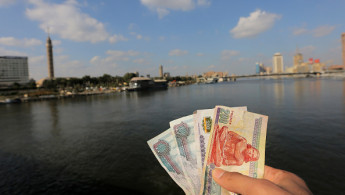Russia adds Egyptian pound to exchange rate list against ruble
Russia's central bank has added the Egyptian pound to its exchange rate list in a bid to facilitate trade between the two countries, it said in a statement released earlier last week.
Eight other currencies, including the UAE dirham, the Thai baht, the Vietnamese dong, the Serbian dinar, the New Zealand dollar, the Georgian lari, the Indonesian rupiah, and the Qatari riyal, were also added to the list.
The official exchange rates of these currencies against the Russian ruble were set by the Bank of Russia as of 18 January.
Russia and Egypt have been conducting trade dealings in both of their local currencies since September due to the Western sanctions imposed on Moscow following its invasion of Ukraine.
As a result of the new measures, Russian tourism to Egypt is expected to rise. Tourism is a significant source of national income for Egypt. Some 700,000 Russian tourists visited the country in 2021, the state-run Al-Ahram reported.
One Egyptian pound is equal to about 2.3 rubles at the time of publishing.
In October last year, the Central Bank of Egypt implemented an exchange rate flexibility, allowing the pound's value to be regulated by market forces in a bid to save an already ailing economy.
The Egyptian pound has fallen by almost 100% of its rate against the US dollar following a number of controversial economic measures taken by the government.
The value of the US dollar against the Egyptian pound was EGP 29.78 at the time of publishing.
“Listing the Egyptian pound to be evaluated against the Russian ruble is likely to reduce the rising demand of the US dollar, especially since Egypt and Russia have been strategic partners for decades now,” Financial analyst Farid Othman told The New Arab.
“Conducting commercial transactions in the local currencies of the two countries contributes to speeding up of the flow of trade between them,” he added.
The Egyptian pound has been struggling against the US dollar, which led the prices of basic commodities, mostly imported, to witness unprecedented hikes.
In October, the Central Bank of Egypt implemented an exchange rate flexibility, allowing the pound's value to be regulated by market forces in a bid to save an already ailing economy.
The Egyptian pound has since fallen by almost 100% of its rate against the US dollar.





 Follow the Middle East's top stories in English at The New Arab on Google News
Follow the Middle East's top stories in English at The New Arab on Google News


